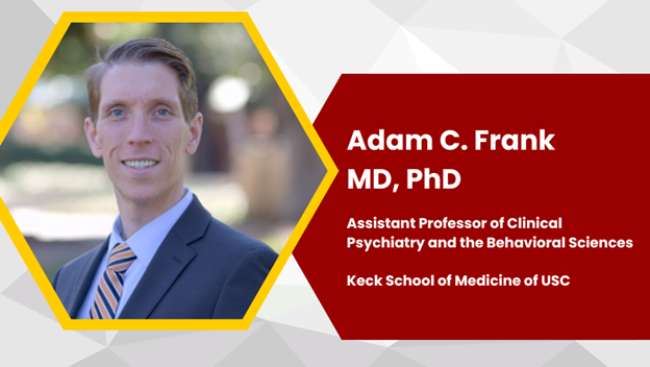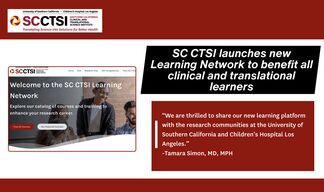An interview with Dr. Adam C. Frank, MD, PhD, 2023 Fall CTSA Program Annual Meeting Poster Winner
Poster title: Machine Learning Approaches on Multimodal and Ambulatory Data to Predict Individual Symptom Course in Adults with Obsessive-Compulsive Disorder

1. Can you summarize the work you presented?
Obsessive-Compulsive Disorder (OCD) is a chronic, impairing, and heterogeneous mental health condition that frequently impacts an individual's ability to function in daily tasks. While we have several treatments, such as medications, psychotherapy, and neuromodulation, we typically choose these in a trial-and-error method without ways to estimate who will respond to which treatments. This prolongs the time to effective treatment and can leave many people with residual symptoms. Also, these symptoms of OCD can fluctuate over time, even in people who respond to treatment. Our study is using a wearable sensor (Fitbit) coupled with longitudinal smartphone-based questionnaires to track behavior (such as step count, hours of sleep, daily activity levels), physiology (such as heart rate and oxygen saturation), and symptom levels in adults with OCD over 10-weeks to build machine learning models that can predict individual symptom course and who will respond to medication treatment.
2. What was something you learned while attending the Fall CTSA meeting?
I was surprised and excited to see the variety of diseases and conditions that are being studied using patient-derived data from wearable sensors. I'm a psychiatrist and I think about the mental health applications of these devices, but physicians and researchers from all spheres of medicine are conducting interesting and novel work in this realm.
3. Can you tell us about any mentorship, guidance, and assistance you have received while being part of our KL2 program?
I've had phenomenal mentorship during my time as a KL2 scholar. My primary mentor, Dr. Bradley Peterson, is a psychiatrist-scientist with expertise in OCD, neuroimaging, and designing and conducting clinical trials. My co-mentor, Dr. Shrikanth Narayanan, is a professor of engineering within the USC Viterbi School of Engineering with expertise in conducting and analyzing data from studies collecting diverse longitudinal biobehavioral data. We've worked closely as a team to design and implement the project I presented at the Fall CTSA meeting. Both mentors have also gone out of their way to provide me with additional opportunities and experiences within clinical research and academic medicine at USC and beyond. Their support and guidance have resulted in publications and successful grant applications already in the first half of my time as a KL2 scholar. Additionally, Drs. Siegel and Patino-Sutton have been invaluable career mentors. In fact, Dr. Siegel and I were jointly awarded, as a mentor-mentee pair, the American Psychiatric Association's prestigious Kempf Fund Award for Research Development in Psychobiological Psychiatry this year, which provides additional monetary support for my research program.
4. In your view, what has been the most valuable part of being in our KL2 program thus far?
Beyond the resources and mentorship provided as part of the KL2 program, I have found my co-scholars to be an amazing resource. Several members of our cohort are even working on a manuscript together that began as a project within the Clinical Translational Research course during our first year as scholars. I truly value their ideas, input, and support.
5. What are your long-term goals once you graduate from the KL2 program?
I am actively planning follow-up studies to my KL2 project and recently submitted a K23 application to NIH that proposes to utilize the data collection and analysis framework we developed to study neuromodulation treatments in OCD. Ultimately, I aim to be an independently funded academic psychiatrist-scientist conducting patient-oriented research that aims to improve understanding of and treatment for individuals suffering from OCD and related disorders.



